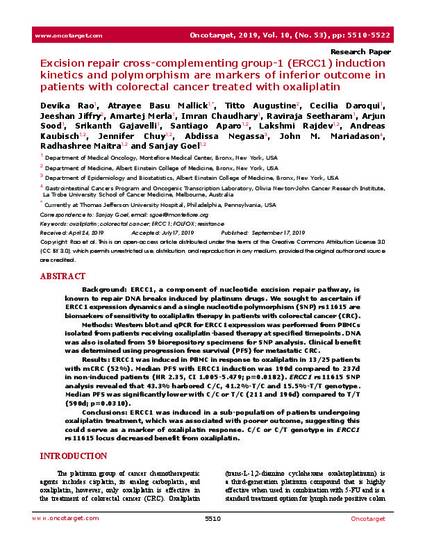
Background: ERCC1, a component of nucleotide excision repair pathway, is known to repair DNA breaks induced by platinum drugs. We sought to ascertain if ERCC1 expression dynamics and a single nucleotide polymorphism (SNP) rs11615 are biomarkers of sensitivity to oxaliplatin therapy in patients with colorectal cancer (CRC).
Methods: Western blot and qPCR for ERCC1 expression was performed from PBMCs isolated from patients receiving oxaliplatin-based therapy at specified timepoints. DNA was also isolated from 59 biorepository specimens for SNP analysis. Clinical benefit was determined using progression free survival (PFS) for metastatic CRC.
Results: ERCC1 was induced in PBMC in response to oxaliplatin in 13/25 patients with mCRC (52%). Median PFS with ERCC1 induction was 190d compared to 237d in non-induced patients (HR 2.35, CI 1.005-5.479; p=0.0182).
Conclusions: ERCC1 was induced in a sub-population of patients undergoing oxaliplatin treatment, which was associated with poorer outcome, suggesting this could serve as a marker of oxaliplatin response. C/C or C/T genotype in ERCC1 rs11615 locus decreased benefit from oxaliplatin.
Available at: http://works.bepress.com/santiago-aparo/36/

This article is the author’s final published version in Oncotarget, Volume 10, Issue 53, September 2019, Pages 5510-5522.
The published version is available at https://doi.org/10.18632/oncotarget.27140. Copyright © Rao et al.